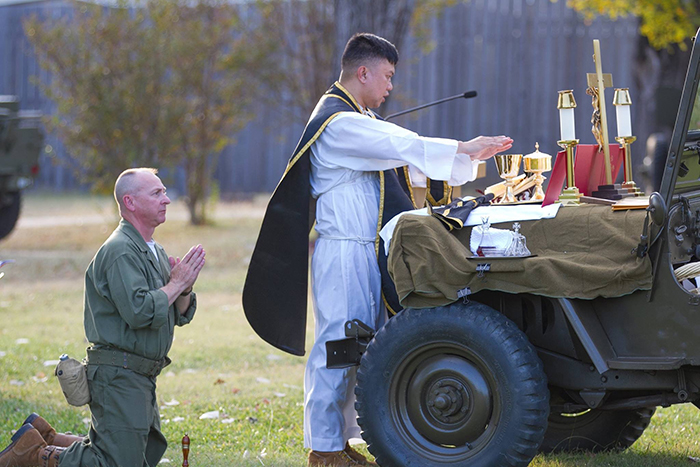Rev José Mario O Mandía
jmom.honlam.org
The Catholic faith uses three degrees of veneration. They are as follows:
(1) Latria. It is the act of adoration or worship given only to God. “And God spoke all these words, saying, ‘I am the LORD your God, who brought you out of the land of Egypt, out of the house of bondage. You shall have no other gods before me’” (Exodus 20:1-3).
(2) Hyperdulia. This is the honor (not worship or adoration) given to the Blessed Virgin Mary: “Behold, henceforth all generations will call me blessed” (Luke 1:48).
(3) Dulia. This is the honor given to the saints whom we ask to pray for us before God. “The prayer of a righteous man has great power in its effects” (James 5:16).
Which kind of veneration do we give the Eucharist? The highest one – latria. That is because the Eucharist is none other than Jesus Christ Himself, who is God and man. As God, He deserves our worship. Before Him, we should bend our knees in adoration (bodily or external worship) and submit our mind, heart, and will in obedience (spiritual or internal worship).
The CCC (1378) says: “In the liturgy of the Mass we express our faith in the real presence of Christ under the species of bread and wine by, among other ways, genuflecting or bowing deeply as a sign of adoration of the Lord. ‘The Catholic Church has always offered and still offers to the sacrament of the Eucharist the cult of adoration, not only during Mass, but also outside of it, reserving the consecrated hosts with the utmost care, exposing them to the solemn veneration of the faithful, and carrying them in procession’ (Paul VI, Mysterium Fidei 56).”
Joseph Cardinal Ratzinger (Benedict XVI) pointed out in his book Spirit of the Liturgy that “kneeling does not come from any culture – it comes from the Bible.” He added that “the man who learns to believe [the Real Presence] learns also to kneel.”
As Pope Benedict XVI, he taught: “Adoring the God of Jesus Christ, who out of love made himself bread broken, is the most effective and radical remedy against the idolatry of the past and of the present. Kneeling before the Eucharist is a profession of freedom: those who bow to Jesus cannot and must not prostrate themselves before any earthly authority, however powerful. We Christians kneel only before God or before the Most Blessed Sacrament because we know and believe that the one true God is present in it, the God who created the world and so loved it that he gave his Only Begotten Son (cf. Jn 3: 16)…. Adoration is prayer that prolongs the celebration and Eucharistic communion and in which the soul continues to be nourished: it is nourished with love, truth, peace; it is nourished with hope, because the One before whom we prostrate ourselves does not judge us, does not crush us but liberates and transforms us” (Homily, Procession of Corpus Christi, 22 May 2008).
THE TABERNACLE
In the Old Testament, God gave Moses detailed instructions on how to construct the tent or the tabernacle that will house the ark of the covenant (cf Exodus 25 to 27). The ark of the covenant is only a symbol of God’s presence, but so much care was taken and so many precious materials were used in its construction. This makes us think of how a tabernacle with the Holy Eucharist must be made. And how the tabernacle of our soul must be prepared to receive Jesus in Holy Communion.
Jesus waits for us there. He does not require us to make an appointment, we can drop by anytime at our convenience. This is why St Paul VI reminds us that we “should not forget about paying a visit during the day to the Most Blessed Sacrament … since this is a proof of gratitude and a pledge of love and a display of adoration that is owed to Christ the Lord who is present there” (Mysterium Fidei,66-67).
Saint John Paul II wrote in Dominicae coenae (no 3; quoted in CCC 1380): “The Church and the world have a great need for Eucharistic worship. Jesus awaits us in this sacrament of love. Let us not refuse the time to go to meet him in adoration, in contemplation full of faith, and open to making amends for the serious offenses and crimes of the world. Let our adoration never cease.” (Photo: liturgyguy.com)


 Follow
Follow


